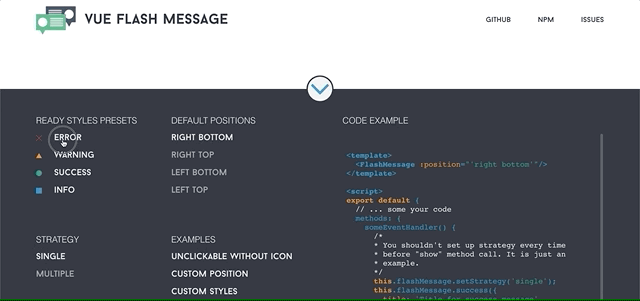README
vue-flash-message

The component to display single flash message or multiple flash messages to user. It has styles presets, but can be easily customized by passing style object as argument.
Live Demo
Docs
Setup
npm i @smartweb/vue-flash-message
Installation and Configuration
Register the component in your app entry point (main.js or as you called it)
import Vue from 'vue';
import FlashMessage from '@smartweb/vue-flash-message';
Vue.use(FlashMessage);
You can pass configuration object as second argument
Vue.use(FlashMessage, config);
Nuxt.js
Create vue-flash-message.js file in plugins directory and put the following code:
import Vue from 'vue';
import VueFlashMessage from '@smartweb/vue-flash-message';
Vue.use(VueFlashMessage);
In your nuxt.config.js file register your plugin
{
/* Since Nuxt.js 2.4, mode has been introduced as option of plugins to specify plugin type, possible value are: client or server. ssr: false will be adapted to mode: 'client' and deprecated in next major release.
More info: https://nuxtjs.org/guide/plugins#client-side-only */
plugins: [{ src: '~/plugins/flash-message.js', mode: 'client' }]
},
Configuration object
| Property | Type | Description | Default |
|---|---|---|---|
| name | String | It is a name of the component and alias for the EventBus global property. | 'flashMessage' |
| tag | String | Custom tag for the component to use in your application. | 'FlashMesage' |
| time | Number | Duration (in ms) of the message display (can be customized during message call). | 8000 |
| strategy | String | You can pass 'single' or 'multiple' to choose the default strategy. It can be changed in process. | 'single' |
Usage
Put the component into your template
<FlashMessage></FlashMessage>
You can pass a string as position property to set up default position of messages block. Valid values: 'right bottom', 'right top', 'left bottom', 'left top'.
<FlashMessage :position="'right bottom'"></FlashMessage>
Now you can access flash message by using global EventBus alias (that is "flashMessage" by default) of your Vue instance
this.flashMessage.show({
status: 'error',
title: 'Error Message Title',
message: 'Oh, you broke my heart! Shame on you!'
});
Methods
Display Methods
Every display message method will return the id of the message instance
this.flashMessage.show({
status: 'error',
title: 'Error Message Title',
message: 'Oh, you broke my heart! Shame on you!'
});
You also can use shorthands without status property.
this.flashMessage.error({
title: 'Error Message Title',
message: 'Oh, you broke my heart! Shame on you!'
});
this.flashMessage.warning({
title: 'Warning Message Title',
message: "Don't stop me nooooow....!"
});
this.flashMessage.info({
title: 'Info Message Title',
message: 'Just want you to know, that Vue is so cool'
});
this.flashMessage.success({
title: 'Success Message Title',
message: 'Hoorah, it is my fist npm package and it works!'
});
You can pass the data object to configure a message instance.
Data Object
The first argument - is data object.
| Property | Type | Description |
|---|---|---|
| status | String | Status of component. Default presets: 'error', 'warning', 'info', 'success' |
| title | String | Title of your message |
| message | String | Text of your message |
| time | Number | Duration (in ms) of the single message. If time equal to 0, message will be show until user click on it. Please, if you combine {clickable: false , time: 0 } in case when you show your own component in flash message block, you should provide user interface element to close message window. |
| icon | String | A URL for icon or image to display |
| clickable | Boolean | Allows to control whether the user can remove message by click on it or not. |
| blockClass | String | custom class name for flashMessage block. |
| wrapperClass | String | custom class name for wrapper block. |
| iconClass | String | custom class name for icon block. |
| contentClass | String | custom class name for content block |
| position | String | in case, when you want to set up custom "fixed" position relative to viewport, you can pass string 'left/right-top/bottom'. Available positions: 'top left', 'top right', 'bottom left', 'bottom right'. |
| x | Number | Amount of pixels to position your message relating to the 'X' axis |
| y | Number | Amount of pixels to position your message relating to the 'Y' axis |
| html | String | You can pass a string with raw html to render inside flash message block axis |
| componentName | String | Register your vue component globally and pass in componentName property of data object to display it inside flash message block |
Example:
methods: {
deleteTrouble() {
this.$axios.delete(`/delete/trouble/${trouble.id}`)
.then( res => {
let { status, data, error } = res.data;
if(status) {
this.flashMessage.success({
title: 'Don\'t Warry',
message: 'Be Happy!',
time: 5000,
blockClass: 'custom-block-class'
});
}
else {
this.flashMessage.error({title: error.name || 'Error', message: error.message});
}
})
.catch(e);
}
}
Callbacks
As second argument you can pass object with two properties: "mounted" and "destroyed".
| Property | Type | Description |
|---|---|---|
| mounted | Function | Will be invoked, when flashMessage appears |
| destroyed | Function | Will be invoked, when flashMessage gone |
Example:
<p>{{ text }}</p>
<button @click="clickHandler" type="button" name="button">Show Text!</button>
For example you can add some sound which will be played when message appears
methods: {
showText() {
this.text = 'Hello from callback!'
},
clearText() {
this.text = 'Bye... 1, ..2, ..3';
let sound = new Audio('audio source'); // add sound source
sound.play(); // and play it
setTimeout( () => this.text = '', 3000);
},
clickHandler() {
this.flashMessage.info({
title: 'Ooooooops!',
message: 'Do you see this text and hear this sound? Wtf?'
},
{
mounted: showText,
destroyed: clearText
})
}
}
Delete Methods
You can delete message programmatically using deleteMessage method
Example:
let id = this.flashMessage.info({
title: 'Hey, man. Time for beer!',
message: 'It is Friday. Time to have a little party.'
});
this.flashMessage.deleteMessage(id);
Set Strategy
You can update default strategy using setStrategy method.
/* Will return {Boolean} as result */
this.flashMessage.setStrategy('multiple'); // strategy changed to multiple
LICENSE
The MIT License (MIT). Please see License File for more information.

